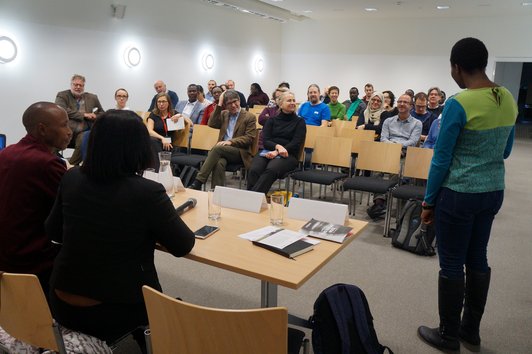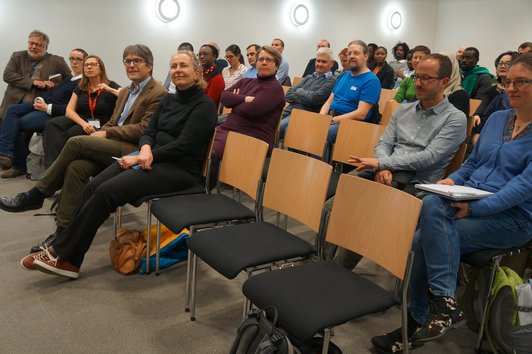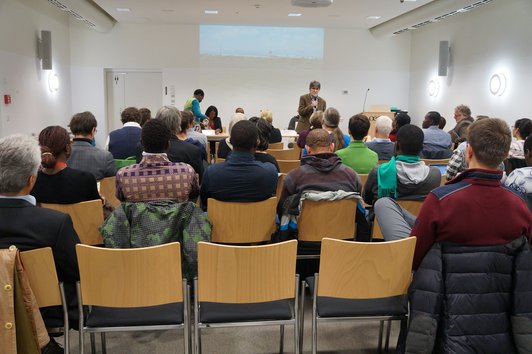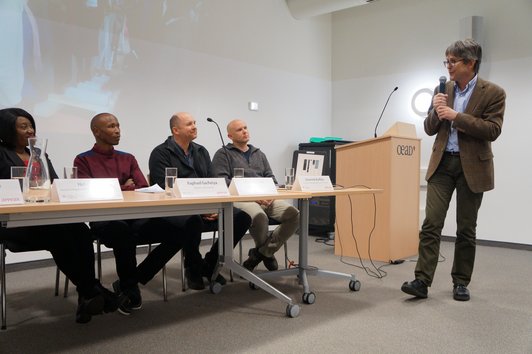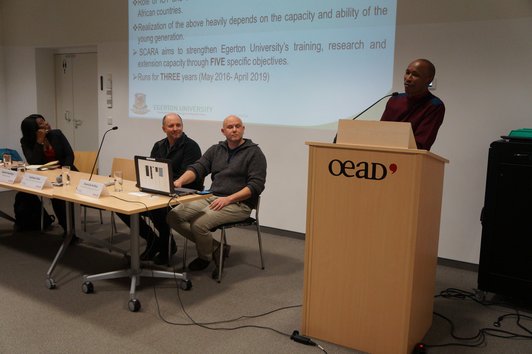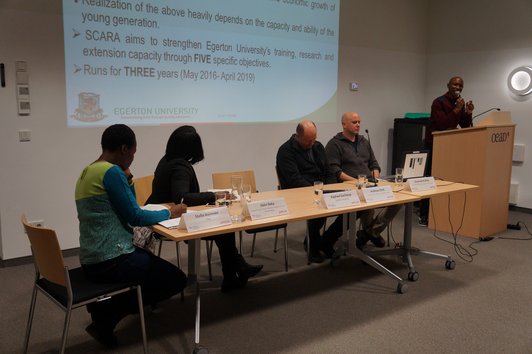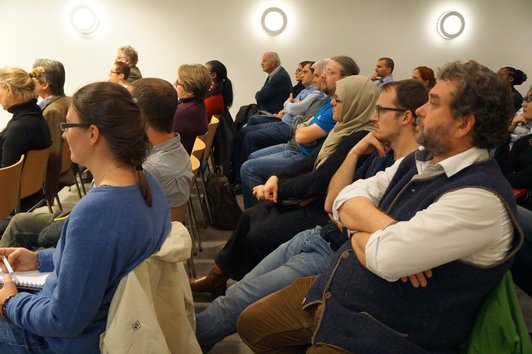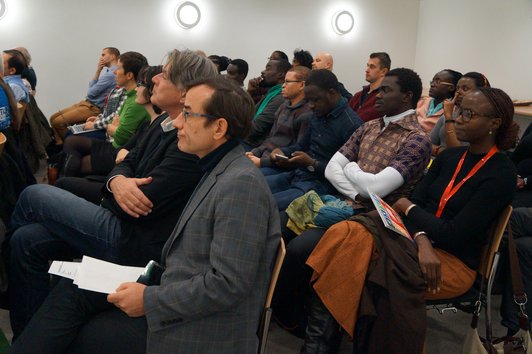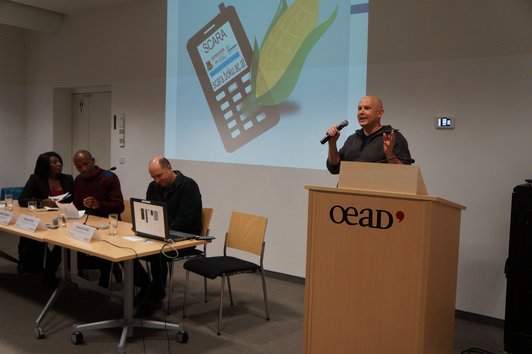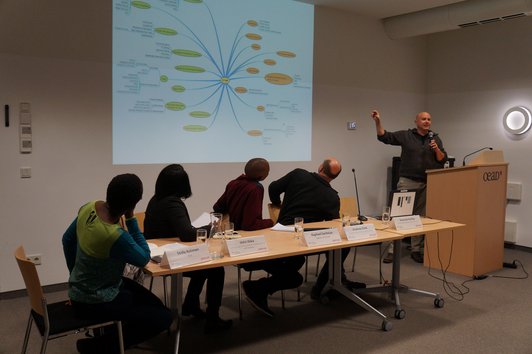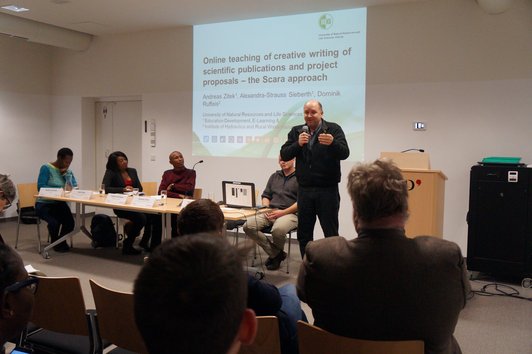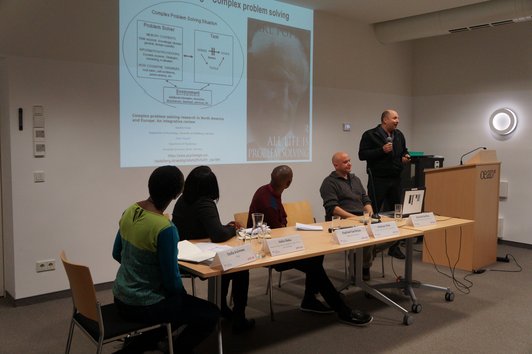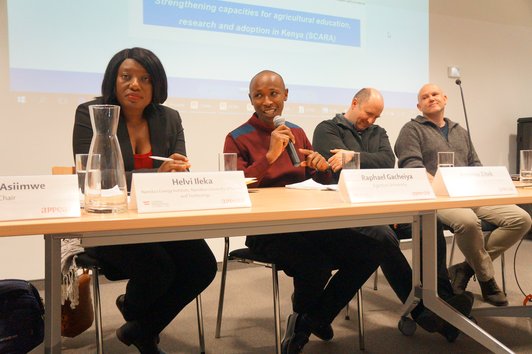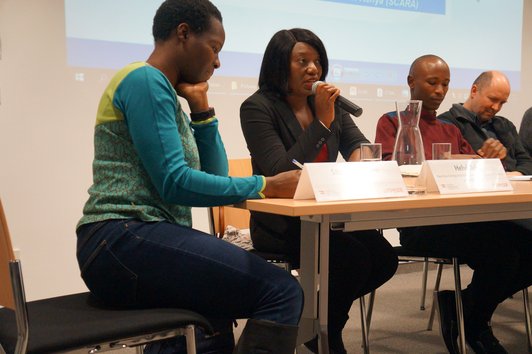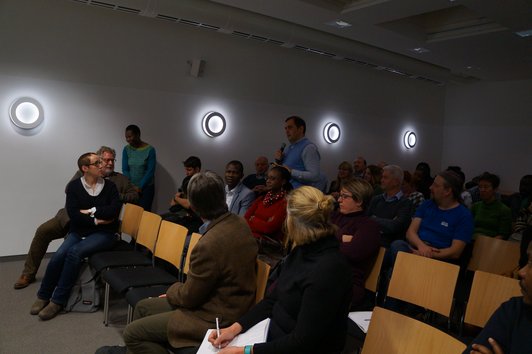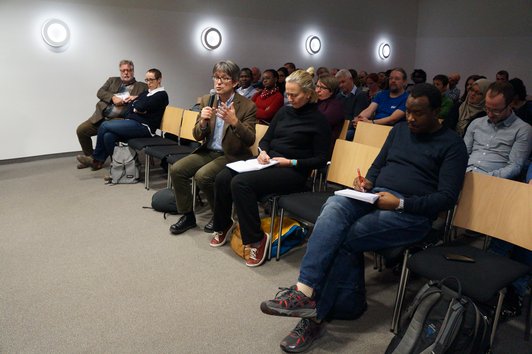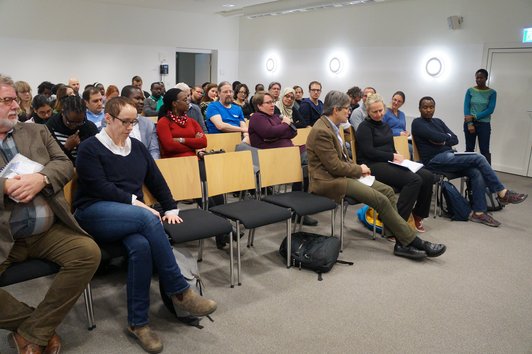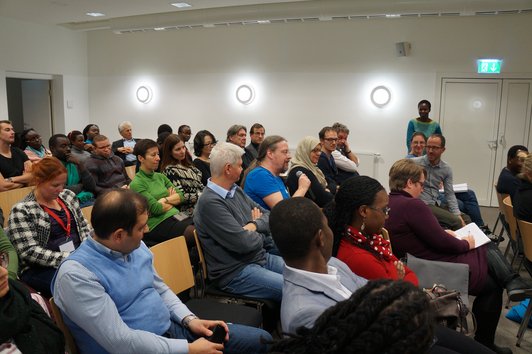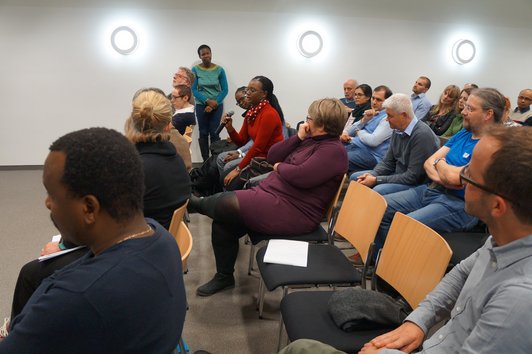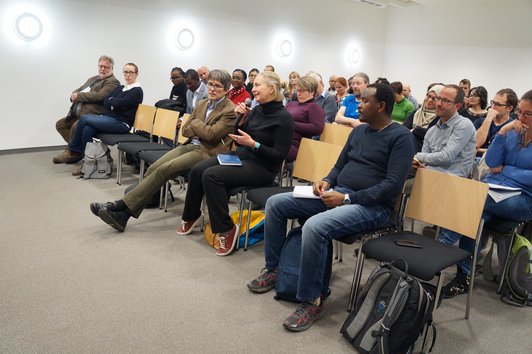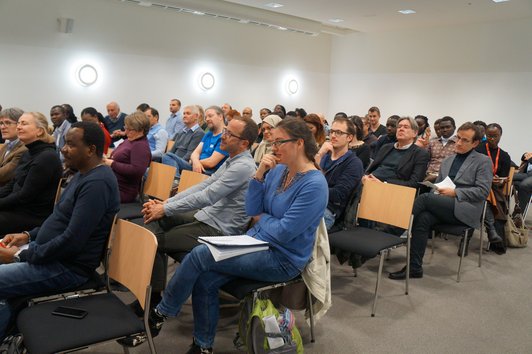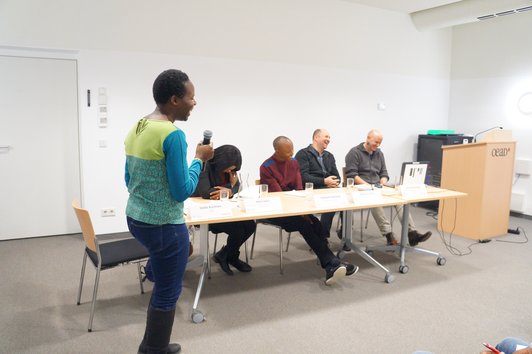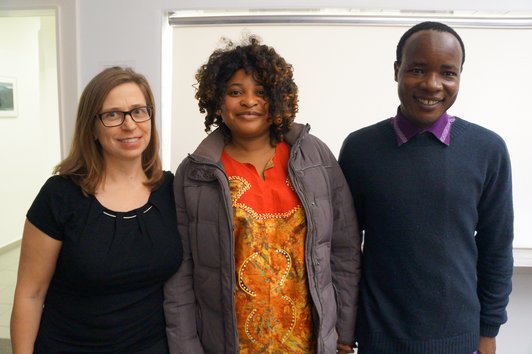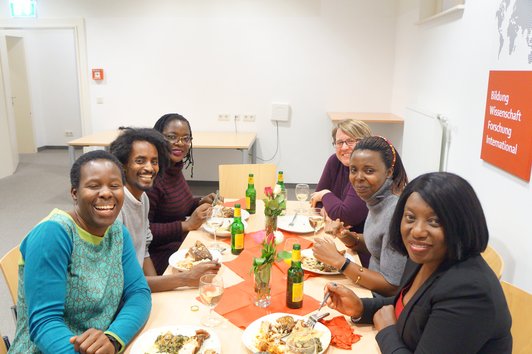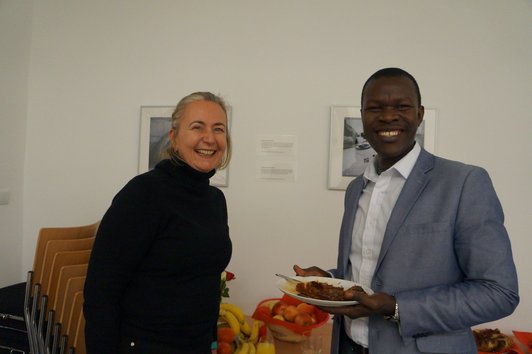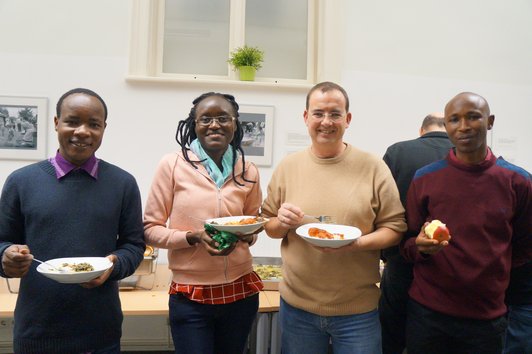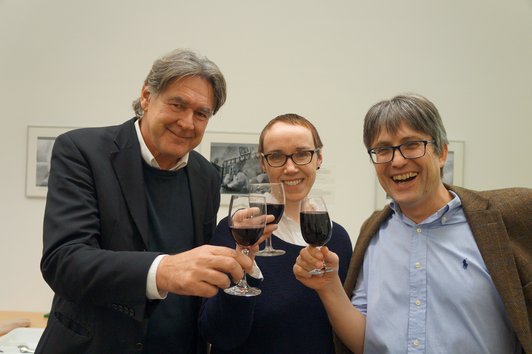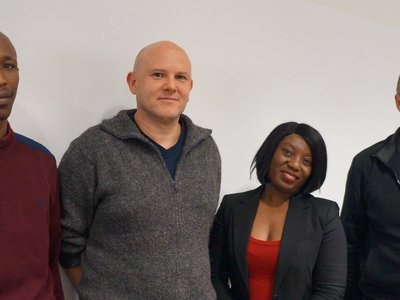

Reinhold Gruber welcomed the guests and panellists on behalf of the Austrian Development Cooperation. He emphasised that this kind of event provides important insights into APPEAR projects, demonstrates what actually works in practice and what the challenges in research cooperation are. According to him the SCARA project is high on the agenda. On the one hand agriculture plays an important role in African economies as many people make their living in this field. On the other hand new communication technologies are key for economic growth as innovations in the mobile phone sector show. Furthermore he stressed the timeliness of the project as Austria – holding at the time of the event the rotating presidency of the Council of the EU – was planning a High-Level Africa-Europe Forum entitled “Taking cooperation to the digital age”.
Digitalisation in Africa
ICT and e-learning provide great opportunities for the development of African countries in the future. Specifically ICT4Ag technologies will have a significant impact on developments in agriculture in Africa, dissemination of knowledge and exchange of information, and they will shape the ways in which farmers access information and use this knowledge. The experiences from the SCARA project demonstrated the significant role of the public educational sector in capacity building and in providing services to involved stakeholders.
ICT for Agriculture technologies in Kenya
Raphael Gacheiya from Egerton University stressed that ICT4Ag technologies can have a significant impact on agriculture. However, the realisation heavily depends on the capacity and ability of the young generation to use these new technologies. This is where the SCARA project comes in. The partnership between Egerton University and BOKU aims at strengthening capacities for agricultural education, research and adoption in Kenya. A multi-sectoral stakeholder approach is used to understand the dimensions of ICT for agriculture in Kenya. One of the main outputs was to set up a Youth Council that will be able to inform the policy makers about the needs of the young generation in agriculture. In addition, an innovation platform where people can meet and interact has been set up. Another interesting activity was the usability evaluation of common Kenyan mobile agri-apps. Students from Egerton University developed the testing procedure under supervision and conducted the usability tests themselves. This provided a great opportunity for them to learn and develop these skills hands-on.
Finally, curricula at Egerton University have been reviewed with regard to the possibility of incorporating ICT in agriculture courses. Over the last few years Egerton University has set up an e-campus that runs 306 courses hosted within 11 programmes. These e-learning courses are aimed at people who are off-campus and those who are employed. The university uses an online platform with a blended learning approach. The strategic university plan between 2018 and 2023 requires all faculties to migrate at least one full programme to e-learning. Gacheiya underlined that a lot of effort was undertaken within the university to facilitate this procedure. However, he concluded that poor and unreliable connectivity and the high infrastructure costs were still the main challenges at his institution.
Innovation platform as a means to integrate different stakeholders
Dominik Ruffeis, University of Natural Resources and Life Sciences, Vienna (BOKU), described the broad field of ICT and agriculture. At the beginning of the project relevant stakeholders such as farmers, extension workers, policy makers, teachers and researchers were mapped and the different dimensions in agriculture were analysed. It is important to be aware of the huge differences between small- and large-scale farmers, between subsistence and commercial farmers. This leads us to the questions who is going to benefit from the project; who is connected to the ICT sphere and who is disconnected. Furthermore, the project has to ensure that small-scale farmers are also on board and that the digital divide is decreased. Ruffeis stressed that when setting up an innovation platform it is not always possible to integrate all stakeholders. However, the aim is to facilitate communication and mutual knowledge exchange. People who usually do not meet are brought together. He gave the example that app developers are not necessarily well connected to the end users. The same is true for farmers and researchers who often do not have the chance to interact.
Agriculture plays a key role in Kenya. Farming is still perceived as an activity of old people while the young generation seeks jobs in other areas. However, the unemployment rate is high and even well educated people cannot find jobs in their respective areas. ICT and digitalisation could give the young generation incentives to be active in the sphere of agriculture.
Aspects of cloud computing are important as those who generate the data usually also own the data. Those who measure the data also want to make it available to the end user. The crucial question is how do you bring early warning systems to farmers? Therefore one aspect of the project is to understand how this process works. It could be a one-way process where no interaction is possible, such as TV or radio. Other options are chatbots or Facebook that facilitate communication. What kinds of software and transport services are in use? What does communication look like when people communicate with artificial services and not with real people? Do farmers trust this information or the tools? Ruffeis concluded that peer-to-peer interaction among farmers is very strong in certain aspects.
Digitalisation and learning processes
In the next part the process of e-learning and technology adoption was discussed by Andreas Zitek, Centre for E-Learning and Didactics BOKU. In his research he focuses on the learning processes and how information is actually translated into knowledge that can be used in daily life. Another important aspect is the integration of digital skills in formal education. E-learning is defined as using electronic or digital resources. Often the blended learning approach is preferred as this consists of face-to-face interaction in the classroom and online learning. At least half of the learning takes place when the participant can choose the time and place to learn. Zitek concluded by giving a concrete example of an e-learning module that was jointly implemented at Egerton University. The aim was to provide creative scientific and proposal writing to students.
The last panellist was Helvi Ileka from Namibia University of Science and Technology and APPEAR Advisory Board member. She shared the experiences with e-learning at the Namibia University of Science and Technology. Ileka stressed that fast internet is required to be effective and that her institution invests a lot in this regard. Furthermore she underlined that many people have mobile phones and access to internet. However, more education is needed so that the community can make use of mobile apps.
The panellists agreed that the integration of ICT at higher education institutions and in the formal and informal education sector was instrumental in reaching the sustainable development goals.
To get a better impression of the SCARA project please visit their project website.
Panellists:
Raphael Gacheiya works as Kiswahili lecturer and examination officer at the Department of Literature, Languages and Linguistics at Egerton University. In addition he is the co-principal investigator of the SCARA Project at the Division of Research & Extension at Egerton University. Raphael has interests in Communication and Language use; specifically language use in a dynamic society, its influence on adoption of ICT and awareness creation, sustainable sanitation, promotion of health and hygiene.
Helvi Ileka is the Head of the Namibia Energy Institute, Namibia University of Science and Technology. Since 2015 Helvi is also a member of the APPEAR Advisory Board. Helvi initiates and conducts research in renewable energy and energy efficiency, advises government on clean energy policy, generates income from other sources than government, creates local and international research networks and partnerships. She holds a Master of Energy and Environmental Management from the University of Twente.
Dominik Ruffeis works as a senior scientist at the Institute of Hydraulics and Rural Water Management at the University of Natural Resources and Life Sciences, Vienna (BOKU). He has experience in climate change adaptation, water resource management and agriculture of small holder farming communities in Africa, Asia and the equatorial Pacific region. His academic interest also evolves towards the direct effect of learning and knowledge management (ICT) on transformation and change processes in a socio-cultural context.
Andreas Zitek works as e-Learning Innovator and Administrator at the Division E-learning and Didactics at the University of Natural Resources and Life Sciences, Vienna (BOKU). He has been involved in the development and evaluation of innovative teaching and learning approaches projects. He also works as lecturer at BOKU, developing, applying and evaluating innovative blended learning activities and course modules, especially related to scientific writing and qualitative modelling.
You missed APPEAR in practice_10 on inclusive education? A short recap and photo gallery can be found here.

